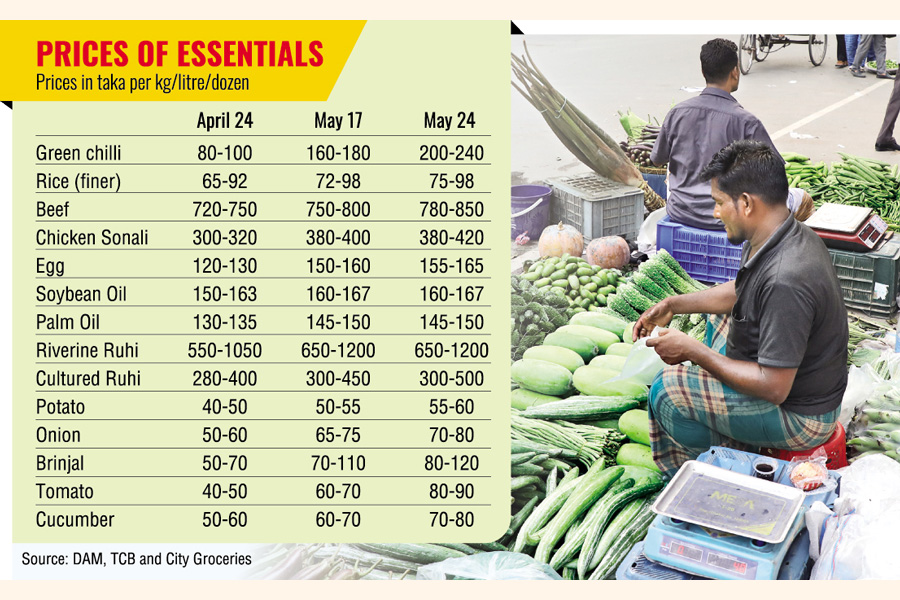Prices of essentials show upward trend
Fixed-income people striving to stay afloat

Published :
Updated :

The rocketing surge in commodity prices has left individuals with constrained incomes struggling to cope.
Commodity prices showed rise again in the last week, leaving the poor and low-income families struggling with their fixed income.
Prices of most of the essential commodities including rice, meat, egg, edible oil, fish, chilli, onion, ginger, other spices and vegetables witnessed further hike last week.
Green chilli hit Tk200-240 a kg marking Tk40-50 a kg hike in a week and Tk 100 a kg in the last two and half weeks.
Prices of the medium and finer varieties of rice increased by Tk 5.0-7.0 a kg as those retailed at Tk65-98 a kg on Friday.
Eggs price hit Tk160-165 a dozen, Pakistani chicken Tk380-420 a kg, making the cheaper protein items costlier, according to market sources.
Beef prices shot up to Tk 780-850 a kg marking Tk50-100 a kg hike in a month.
Brinjal, cucumber, tomato, pointed gourd, snake gourd, bitter gourd, okra, papaya, ridge gourd and other vegetables witnessed a hike as those sold at between Tk60 and Tk100 a kg.
The price pressure imperiled millions of people who had been struggling to stay afloat as their income has not increased in accordance with the inflation, said vice president of Consumers Association of Bangladesh (CAB) SM Nazer Hossain.
He said in recent weeks, consumers have paid additional 15-20 per cent costs for chicken, cultured fish, vegetables and many kinds of spices.
He also said the government's failure in effective market monitoring is mainly responsible for the hike in prices of essentials by such high margin.
He said market manipulators are not punished despite evidence of their involvement in price manipulation.
Professor Selim Raihan, executive director of the South Asian Network on Economic Modeling (SANEM), said government data is showing above a 9.0 per cent inflationary rate for the last one year.
Citing from the Bangladesh Bureau of Statistics (BBS), he said last month it was 9.73 per cent (point to point) when wage increase was only 7.85 per cent.
The government itself is recognising that the real income of day labourers and other wage earners have been declining, he said.
He said this way millions of people might newly fall into poverty trap in Bangladesh.
Farm economist Prof Gazi MA Jalil said prices of both farm inputs and essential produce have increased notably in the last one year.
He said higher input costs have been resulting in high prices of food crops.
He added the appreciation of US dollar against the local currency is also causing surge in prices of the import dependent products like pulses, sugar, edible oil, wheat, spices and others.
He also echoed about market management by the government to minimise sufferings of the consumers.
Meanwhile, about 37.24 million people in Bangladesh, who account for nearly 22 per cent of the total population, are facing moderate to severe food insecurity, as per government survey.
The rate is below 20 per cent only in
Dhaka and Chattogram while it is 22 to 30 per cent in six other divisions-- as per the key findings of the Food Security Assessment and FIES Survey 2023 and FBS or Food Balance Sheet conducted under the Food Security Statistics Project 2022 under the Bangladesh Bureau of Statistics (BBS).
tonmnoy.wardad@gmail.com


 For all latest news, follow The Financial Express Google News channel.
For all latest news, follow The Financial Express Google News channel.